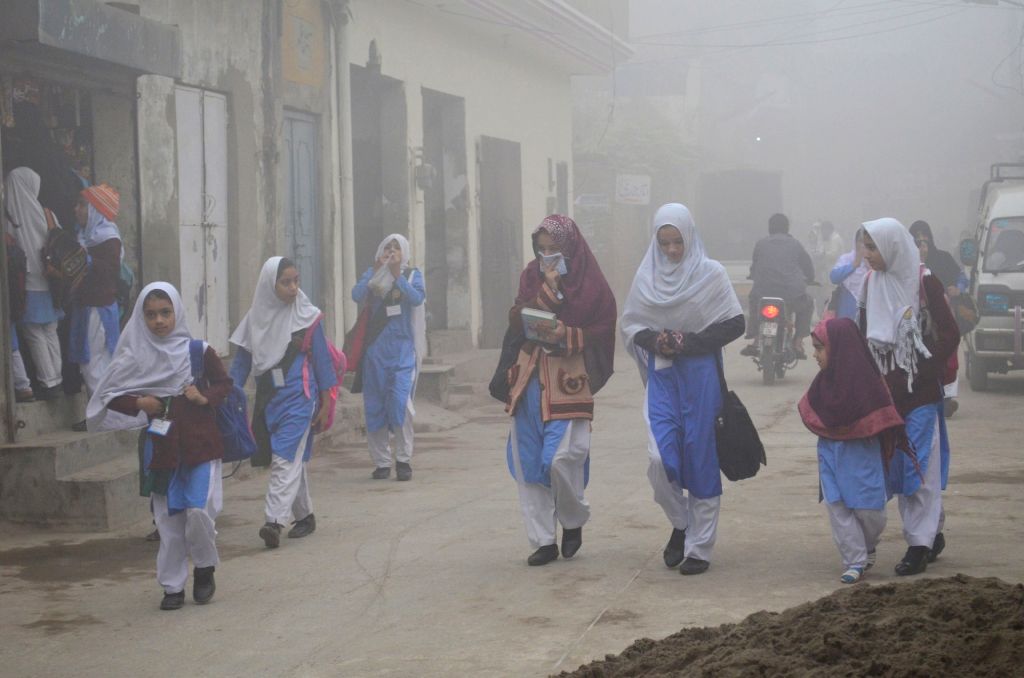
In response to alarming pollution levels, the Punjab government has announced a one-week closure of all primary schools in Lahore, starting Monday, November 4, 2024. This decision aims to protect millions of children from hazardous smog that exceeds dangerous air quality levels.
Severe Smog Conditions
Lahore, home to approximately 14 million residents, has been shrouded in smog caused by a combination of low-quality diesel emissions, smoke from seasonal agricultural burning, and winter cooling effects. The air quality index (AQI) in Lahore surpassed 1,000 on Saturday, significantly exceeding the 300-mark considered “dangerous,” according to data from IQAir.
The Punjab government reported that air quality levels remained above 1,000 on Sunday, marking a new record for pollution. Jahangir Anwar, a senior official with the Environmental Protection Agency in Lahore, stated, “Weather forecasts predict that wind patterns will remain unchanged for the next six days. Therefore, we are closing all government and private primary schools for a week.”
Impact on Children and School Operations
The closure affects all classes for children up to 10 years old, including public, private, and special education institutions. The local government will reevaluate the situation next Saturday to determine if the school closure needs to be extended.
Punjab Senior Minister Marriyum Aurangzeb emphasized the health risks associated with the smog, urging that masks should be mandatory for students. She also noted that health monitoring systems have been established in hospitals to track the impacts of pollution on children.
Health Risks of Air Pollution
Prolonged exposure to toxic air can lead to severe health issues, including strokes, heart disease, lung cancer, and respiratory illnesses. On Saturday, PM2.5 levels in Lahore were recorded at more than 40 times the World Health Organization’s acceptable limits. Although there was a slight decrease in pollution levels on Sunday morning, they remained critically high.
Government Actions Against Pollution
Last week, the provincial environmental protection agency announced new restrictions in four pollution hotspots within the city. These measures include banning tuk-tuks with polluting two-stroke engines and prohibiting restaurants from barbecuing without proper filters. Additionally, government offices and private businesses will implement a work-from-home policy for half of their staff starting Monday.
Children are particularly susceptible to the harmful effects of air pollution due to their developing lungs and higher breathing rates compared to adults. To further protect children, authorities previously restricted outdoor exercise for schoolchildren until January and adjusted school hours to avoid travel during peak pollution times.
Collaborative Efforts to Combat Smog
Punjab Chief Minister Maryam Nawaz highlighted the need for Pakistan and India to collaborate on addressing the smog crisis affecting both nations. Speaking at a Diwali event, she proposed initiating climate diplomacy with Indian Punjab, framing it as a humanitarian issue rather than a political one.
She stated, “We need a coordinated response from both sides to effectively tackle the smog problem. Until both Punjabs work together, we won’t be able to address this issue comprehensively.”
Conclusion
As Lahore grapples with unprecedented pollution levels, the closure of primary schools reflects urgent efforts to safeguard children’s health. The government’s proactive measures and calls for regional cooperation highlight the critical need for a united approach to combat air pollution in South Asia.


